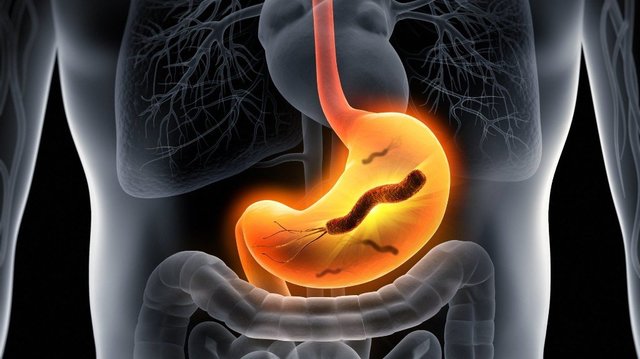Source: Thailand Medical News Oct 31, 2019 6 years, 3 months, 3 days, 10 hours, 31 minutes ago
Medical researchers from the universities of Leeds, Münster and Erlangen have uncovered a novel
antibiotic-free approach that could help prevent and treat one of the most widespread bacterial pathogens, using
nanocapsules made of natural ingredients.
 The Helicobacter pylori
The Helicobacter pylori (
H. pylori) is a bacterial pathogen carried by 4.4 billion people worldwide, with the highest prevalence in Africa, Latin America, Asia and the Caribbean. Although the majority of infections show no symptoms, if left untreated the pathogen can cause chronic
inflammation of the stomach lining, ulcers and is associated with an increased risk of
gastric cancer.
In early 2017, the World Health Organisation included
H. pylori on its list of antibiotic-resistant "priority pathogens" a catalogue of bacteria that pose the greatest threat to human health and that urgently need new treatments.
Current treatments involve multi-target therapy with a combination of
antibiotics, but this has promoted the emergence of resistant strains. Also the incidence of
gastric cancer and stomach and intestinal ailments has risen accordingly.
British and German scientists have uncovered a novel
antibiotic-free approach using only food- and pharmaceutical-grade ingredients, which are non-toxic and safe for consumption, to be used as a supplement to complement
antibiotic current therapies.
The formulation is delivered through billions of bundled together
nanocapsules, which are smaller than a human blood cell, and prevents the bacteria from attaching to and infecting the stomach cells.
The research team, which includes medical scientists from the universities of Leeds, Münster and Erlangen, hope the
nanocapsules could be used as a preventative measure, as well as helping eradicate
H. pylori and reduce a
ntibiotic-resistant strains.
“Antimicrobial resistance is one of the biggest challenges facing the world and it is predicted to cause more deaths than cancer by the year 2050 unless urgent action is taken.
Helicobacter pylori
pan> is a globally-spread pathogen. It is estimated that up to 70% of people host this pathogen worldwide. The bacteria hide under the gastric mucus layer where
antibiotics do not penetrate effectively. This often leads to recurrent infections and gives rise to resistant strains. New integral approaches are needed to tackle antimicrobial resistance and research into alternatives to
antibiotics is vital. This novel formulation, consisting of small capsules made of natural ingredients, could offer a new means to deter a globally-spread ‘superbug’ pathogen.” commented Professor Francisco Goycoolea, co-author of the study in an interview with
Thailand Medical News.
The new research was carried out in vitro using bacteria and stomach cells outside a human body. The
nanocapsules are loaded with
curcumin a natural compound found in turmeric which has well-documented anti-inflammatory and anti-tumour properties. The capsules are coated with lysozyme, an enzyme that helps prevent bacterial infections, and a very low concentration of dextran sulfate, a water-soluble polysaccharide that binds receptors in the bacteria and in the mucosal layer that coats the stomach.
The
curcumin nanocapsules are bundled together in the required dose and the formulation prevents the bacteria from adhering to the stomach cells. The team has filed a patent based on this formulation.
“Standard
antibiotics used in today’s clinical practice are quite broad-acting compounds, disturbing cell wall architecture, protein formation of membrane integrity. A new generation of antibacterials might be based on more specific molecular targets of the bacteria, acting probably not as broad as the older compounds, but therefore more precisely against specific virulence factors of specific bacteria” commented Professor Andreas Hensel, study co-author.
The research published in ACS Applied Bio Materials might pinpoint a new way towards controlled drug targeting against
H. pylori and its specific adhesion and virulence factors.
The team is also planning a human clinical trial in early 2020.
Reference: Menchicchi
et al. (2019) Low-Molecular-Weight Dextran Sulfate Nanocapsules Inhibit the Adhesion of
Helicobacter pylori to Gastric Cells.
ACS Appl. Bio Mater. DOI:
https://doi.org/10.1021/acsabm.9b00523
